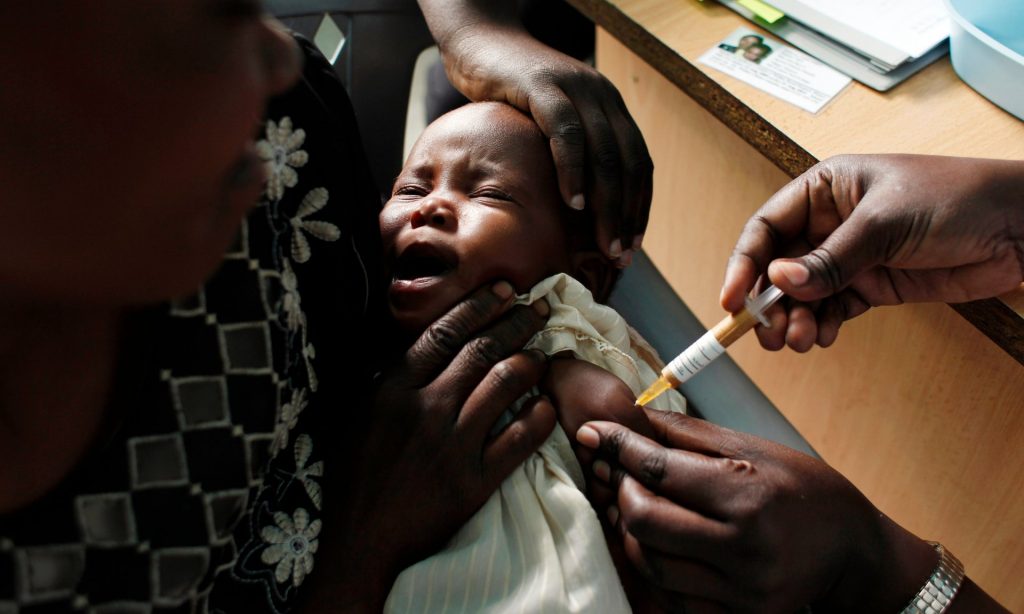
Photograph: Karel Prinsloo/AP
Further doubts about the future of the world’s first malaria vaccine have been raised by research that shows the protection given by three doses declines to almost nothing over seven years.
As the vaccine wears off, the study shows that children living in areas where there is high transmission of the disease end up with more infections than those who have never had a jab – known as the malaria rebound effect. Unvaccinated children – if they survive malaria – develop some natural immunity over the years.
Four doses are known to protect children for longer, but as the protection will still wane, the question that needs to be answered is “are we just kicking the can down the road”? said Prof Philip Bejon, director of the Kemri-Wellcome Trust research programme in Kenya, which conducted the latest study.
In spite of the results of the trial in Kilifi, Kenya, which was published in the New England Journal of Medicine, those behind the development of the vaccine said it must still be rolled out in pilot programmes to thousands of children in Africa by the World Health Organisation as planned. The children will be given four doses rather than three.
The toll in death and disability from malaria among children is so great that the vaccine still could have a role to play in decreasing the number of cases in the early years of life, say those behind the vaccine’s development.
Dr David Kaslow, vice-president for product development at Path, a non-profit international organisation that has been a key player with the pharmaceutical firm GlaxoSmithKline, said up to six doses could be needed to maintain the protective effect.
Since children were getting malaria at a later age, he said, “we need to make sure we also have got immunity during that age period as well, verifying the need for a 4th dose and potentially a 5th and 6th dose”.
That raises logistical questions. The vaccine is already not given to the same schedule as the other infant jabs, and further doses would entail families bringing their children back many times. It will also significantly increase the costs.
Kaslow said: “It is tragic that we have vaccine-preventable diseases and cannot get vaccines into the arms of those who need them. We should be spending more on this, rather than say it is a zero-sum game and we need a Faustian bargain.”
But although research has shown that four shots of the malaria vaccine are cost-effective, the need for more could change the picture, and Kaslow acknowledged there was a need for a “very careful cost-effectiveness analysis”.
The RTS,S vaccine, as it is called, was greeted as a breakthrough even though it only offers partial protection; 39% among children given four shots starting between five and 17 months of age. Gavi, the global alliance for vaccines and immunisations, said last week it would put up to $27.5m (£20m) into the funding of the pilot projects in three to five locations in Africa, provided that the sum was matched by others. The WHO says the total estimated budget for the vaccine programme is $101m over six and a half years.
The WHO pointed out that the new study was a small follow-up of about 400 children who were vaccinated in an early stage of the trials and who only got three doses. “The results indicate that efficacy wanes over time and clearly signal, which is important for policy decisions, the need for a fourth dose of the vaccine,” said a spokesperson.
“It remains important to proceed with the pilot implementation programme WHO has advised. By conducting the pilots, the international health community can determine what the role of this vaccine will be for public health.”
The trial found that during the first year, the risk of getting malaria in the vaccinated children was 35.9% less than in the control group, but after seven years this protection fell to 4.4%.
“We found that three-dose vaccination with RTS,S was initially protective, but this was offset by a rebound in later years among children exposed to higher than average levels of malaria-carrying mosquitoes,” said Bejon.
“While our results raise the possibility that being exposed to very high levels of malaria parasites may undo some of the benefits of RTS,S, our sample size was too small to draw any definitive conclusions about the long-term efficacy of the vaccine.”

